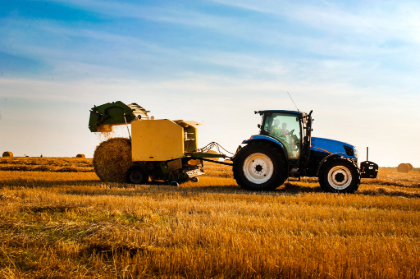INDEPENDENT DEALER
Mandan, ND | (701) 426-8970
OUR BLOG
Learn essential harvest equipment maintenance tips from OilWerx in Mandan, ND, to keep your combines and grain trucks running reliably when every hour counts during North Dakota's demanding harvest season.

October in North Dakota means harvest season is in full swing, and your combines and grain trucks are working overtime. With narrow harvest windows and unpredictable weather, equipment breakdowns can cost thousands in lost productivity and spoiled crops.
1. Pre-Harvest Equipment Inspection Checklist
Before your machinery hits the fields, a thorough inspection can prevent costly mid-harvest failures. Start by checking all fluid levels, including engine oil, hydraulic fluid, and coolant.
Look for signs of wear on belts, chains, and bearings. Even minor issues can escalate quickly when equipment runs 12-16 hours daily. Pay special attention to air filters - North Dakota's dusty harvest conditions can clog them faster than expected.
2. Engine Protection for Extended Runtime
Modern combines demand exceptional engine protection during harvest's punishing conditions. The best synthetic oil for farm machinery provides superior heat resistance and maintains viscosity even after hours of continuous operation.
Heavy-duty diesel oil with advanced synthetic formulation delivers superior wear protection compared to conventional oils. This advanced protection becomes critical when your combine engine runs hot during long days cutting through dense crops. The synthetic formula resists breakdown, maintaining protective film strength even in extreme temperatures.
Ready to protect your combine engine through long harvest days? Contact OilWerx in Mandan, ND, at (701) 426-8970 or stop by the AMSOIL's online store for heavy-duty synthetic oils to shield your harvest equipment maintenance with superior wear protection.
3. Hydraulic System Care During Peak Loads
Your combine's hydraulic system works harder during harvest than at any other time. Headers raise and lower constantly, and hydraulic drives power critical components throughout the machine.
Check hydraulic fluid levels daily and watch for contamination signs like milky appearance or metal particles. Quality hydraulic fluid maintains consistent performance whether it's a crisp 40°F morning or an 85°F afternoon. Regular filter changes prevent contamination from damaging expensive hydraulic pumps and valves.
4. Grain Truck Maintenance Between Loads
Grain truck care for North Dakota farms requires special attention during harvest's stop-and-go demands. These workhorses face unique challenges - heavy loads, frequent starts, and dusty conditions that tax every system.
Monitor tire pressure closely, as heavy grain loads combined with field travel can cause rapid wear. Check brake systems regularly - grain dust can accelerate brake component wear. Transmission fluid deserves extra attention, too, as constant shifting under load generates significant heat.
5. Air Filtration in Dusty Conditions
Nothing threatens harvest equipment faster than inadequate air filtration. North Dakota's dry October conditions create clouds of crop dust that can destroy an engine if filtration fails.
Inspect air filters daily during active harvest. Consider keeping spare filters on hand for quick field changes. Some operators run dual-filter systems or pre-cleaners to extend the life with proper care. Remember - a clogged air filter risks engine damage and reduces fuel efficiency when fuel consumption is already at its peak.
6. Daily Maintenance Routines That Save Time
Establishing consistent daily maintenance routines helps keep combines running during harvest without unexpected downtime. Start daily with a walk-around inspection, checking for loose bolts, worn components, or fluid leaks.
Grease all lubrication points according to the manufacturer's specifications. During harvest, high-use bearings may need greasing as frequently as every 10-50 hours of operation, depending on conditions. Keep detailed maintenance logs—they help identify patterns before failures occur and prove valuable for warranty claims.
Don't let equipment failures disrupt your harvest schedule! Call OilWerx in Mandan, ND, at (701) 426-8970, or check out AMSOIL's online store for maintenance products that keep combines and grain trucks running reliably through peak season.
7. Cold Weather Preparation
North Dakota's October weather can shift from summer-like to near-freezing overnight. Your equipment needs to handle both extremes without missing a beat.
Use multi-viscosity synthetic oils that flow easily during cold morning starts yet maintain protection during hot afternoon runs. Check coolant freeze protection levels and battery conditions. Cold-weather starting aids should be serviced before you need them - nothing's worse than a combine that won't start on a frosty morning with crops ready to harvest.
8. Post-Harvest Storage Preparation
As harvest winds down, proper storage preparation protects your investment through winter. Change all fluids while engines are warm to remove contaminants. Fill fuel tanks to prevent condensation, adding fuel stabilizer to prevent degradation.
Clean equipment thoroughly, removing all crop residue that can trap moisture and cause corrosion. Apply rust preventatives to exposed metal surfaces. Document any repairs needed so you can address them during the off-season rather than discovering problems next harvest.